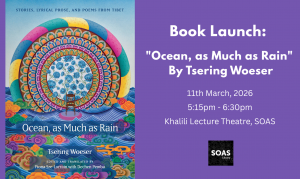This article mentions Dhondup Wangchen and Liu Xiaobo. Dhondup Wangchen was sentenced to 6 years imprisonment on December 28, 2009 for making the documentary film “Leaving Fear Behind“. The sentence was reported by international media, including Reuters, and attracted the attention of international human rights groups, including Amnesty International.
Liu Xiaobo’s sentencing to 11 years imprisonment on December 25, 2009 for his role in drafting Charter 08 provoked international outcry.
Recently there was once again some bad news that Dhondup Wangchen was sentenced to 6 years in prison. Four days before the end of 2009, a sentence was handed out to him in secret in Xining. Neither he nor his relatives, no-one received the relevant procedures which must be carried out by the legal departments in China. The 35-year-old Amdo farmer, son to elderly parents, husband to a thin and vexed wife and father to four young children, had been detained since the end of March 2008 for making a 25 minute documentary and suffered such a heavy punishment, on average 3 months imprisonment for every minute. Moreover, if counting the sentence from the date he was tried, then the calculation would be as follows: 4 months for every minute!
Dhondup Wangchen was charged with “subversion of state power.” A foreign journalist asked me on the phone, what do I think about this accusation? And in front of my eyes appeared a scene out of Dhondup Wangchen’s film that I can never forget, a scene that makes me shed tears every time when I watch it again: an old monk sitting in a dark corner, choking with sobs, saying: “For the Dalai Lama to come back is my greatest wish and dream but it doesn’t look like this will be realised…Dalai Lama, Dalai Lama, I pray to you … Whenever I hear his name, then I am filled with faith, devotion and deep deep sadness. The situation is hopeless. I feel exhausted. It’s as though I were walking alone, with no destination, endlessly. ”
Also in front of my eyes appeared a recollection by British Tibetan Dechen Pemba who met him on completion of filming: “Within minutes of our meeting, I was struck by his determination and drive to accomplish something that he felt was important − to depict the injustice of life as a Tibetan under Chinese rule. As one of his interviewees so eloquently said, “We Tibetans living in the PRC are like stars on a sunny day, we can’t be seen.”
I told the journalist that Dhondup Wangchen did not have any professional training and used a simple video camera to record the true underlying feelings of so many Tibetans to reflect the oppression and discrimination they are subjected to in their living conditions, and to voice their real wishes. The purpose was so that the outside world would understand what is in the hearts of Tibetans, if this is “subversion of state power,” then the regime is too inhumane, too weak. Therefore Dhondup Wangchen’s imprisonment, from another perspective, has also confirmed the authenticity of the documentary film, and one can fully understand why people outside Tibet say that the lives of the Tibetan people have been ravaged. On my blog, there are Chinese people leaving comments saying that “the Chinese Communists … … such a heavy sentence for this amateur photographer shows the Chinese Communist Party being too intolerant, and they are making themselves a laughing stock,” Essentially though, this is not at all a question of being magnanimous or not.
Former Czech President Vaclav Havel, one of the signatories of that year’s “Charter 77”, addressed President Hu Jintao in an open letter a week ago protesting the illegal imprisonment of Chinese independent intellectual, Liu Xiaobo, to 11 years. In the letter, he asked the following questions where “the court in Beijing shamefully sentenced” Liu Xiaobo accusing him of “inciting subversion of state power”: “There is nothing subversive to state security when intellectuals, artists, writers and academics exercise their core vocation: to think, re-think, ask questions, criticize, act creatively, and try to initiate open dialogue. … There is nothing subversive to state security or damaging to future prosperity when citizens act guided by their own will and according to their best knowledge and conscience, when they associate among themselves to discuss and express peacefully their concerns and visions about the future development of their society. On the contrary, a country’s material and spiritual future is undermined when its citizens are not allowed to act, associate, think and speak freely.”
In fact, we are living in a country where the spiritual has already been undermined, when someone like Dhondup Wangchen who has been the conscience of mankind is consigned to a dark prison, I am afraid the future of this country will sink into hatred and brutality.
January 12, 2010, Beijing







Follow Us!